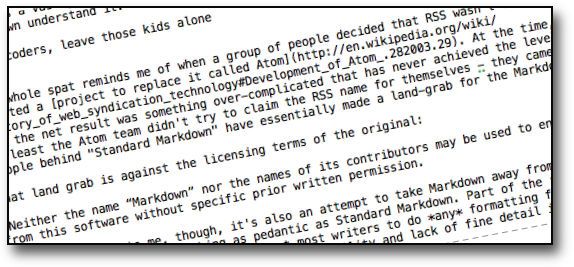Writers, Coders and the Markdown landgrab
If Standard Markdown (now CommonMark) wants to replace Markdown, it needs to acknowledge that it's not just a markup standard for coders.

If you’re not interested in the technical specifics of writing for the web, you might want to look away now.
For the last couple of years, I’ve written pretty much everything I’ve produced for the web in Markdown, a flavour of text markup that can easily be converted into proper HTML. The core idea, as far as I can see, is providing a way of writing properly formatted web-native content, without having to lift your fingers from the keyboard to click a button on your formatting bar, or write out the full HTML.
It’s much easier to write:
[Daring Fireball](http://www.daringfireball.net)
than
<a href="http://www.daringfireball.net">Daring Fireball</a>
or
*silly idea*
than
<em>silly idea</em>
I’ve had many people ask me how I produce well-formatted, linked Liveblogs so quickly. Markdown is certainly a big part of the answer.
It creates a natural flow in your writing that allows you to make decisions about the formatting that make those choices a natural part of the copy, rather than something you add in afterwards. It took me a couple of weeks of referring to the simple guide to get the hang of it, and ever since then, my life has been easier.
Markdown in Muddy Waters
And so, I noted with interest via Dave Winer’s blog, that something was going on with Markdown:
Whatever comes after Markdown should be as respectful as the Rolling Stones were to Muddy Waters. It seems so simple.
Following his links, I discover that some people who were dissatisfied with Markdown as conceived by John Gruber have come up with what they call Standard Markdown. It’s like Markdown but, well, horribly complex. Winer’s point, and it’s a good one, is that it should have been called something different. I agree. What they’ve produced is a very different beast.
Look at this page, explaining the Standard Markdown syntax. And compare it with the original page. I know, as a journalist, I would never have started learning Markdown if I was presented with the former of the two. It’s just way too complex. The additions and changes they’ve made are based around constructing content that’s more sophisticated in its display needs than most written content – copy that includes code, essentially. But rather than extending Markdown, they’ve sought to replace it.
Gruber made it pretty clear what Markdown was designed for:
Markdown is a text-to-HTML conversion tool for web writers. Markdown allows you to write using an easy-to-read, easy-to-write plain text format, then convert it to structurally valid XHTML (or HTML).
To my eyes, Standard Markdown is not written for web writers, it’s written for coders that write for the web. There’s a vast gulf between those two things, and I’m not seeing any indication that the people behind Standard Markdown understand it.
Hey, coders, leave those kids alone
The whole spat reminds me of when a group of people decided that RSS wasn’t doing what they wanted it to, and started a project to replace it called Atom. At the time, that seemed like a good plan, but the net result was something over-complicated that has never achieved the level of ubiquity that RSS has. But at least the Atom team didn’t try to claim the RSS name for themselves – they came up with something new. The people behind “Standard Markdown” have essentially made a land-grab for the Markdown name.
That land grab is against the licensing terms of the original:
Neither the name “Markdown” nor the names of its contributors may be used to endorse or promote products derived from this software without specific prior written permission.
More importantly to me, though, it’s also an attempt to take Markdown away from writers. You will never get non-coding writers to use something as pedantic as Standard Markdown. Part of the reason for the existence of the original is that it’s hard enough to get most writers to do any formatting for the web. It eases that process, and that’s why it’s been successful. Its flexibility and lack of fine detail is a feature, not a bug.





